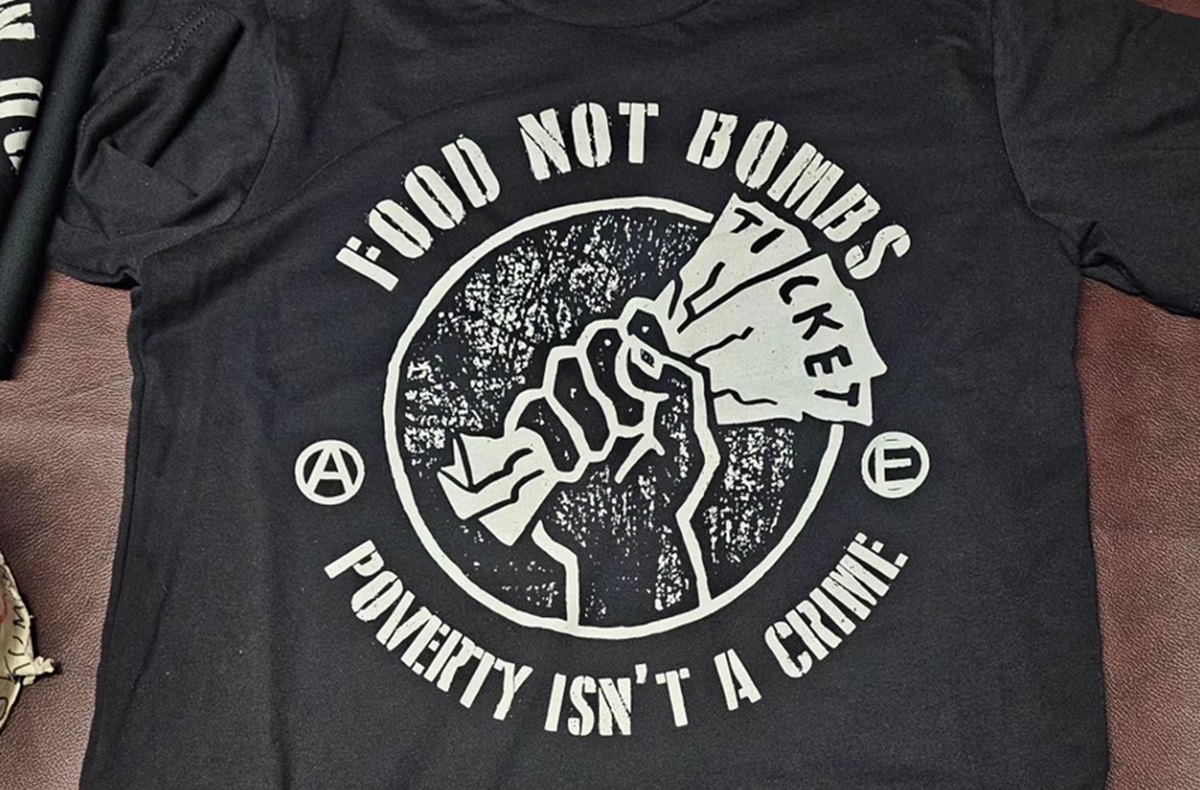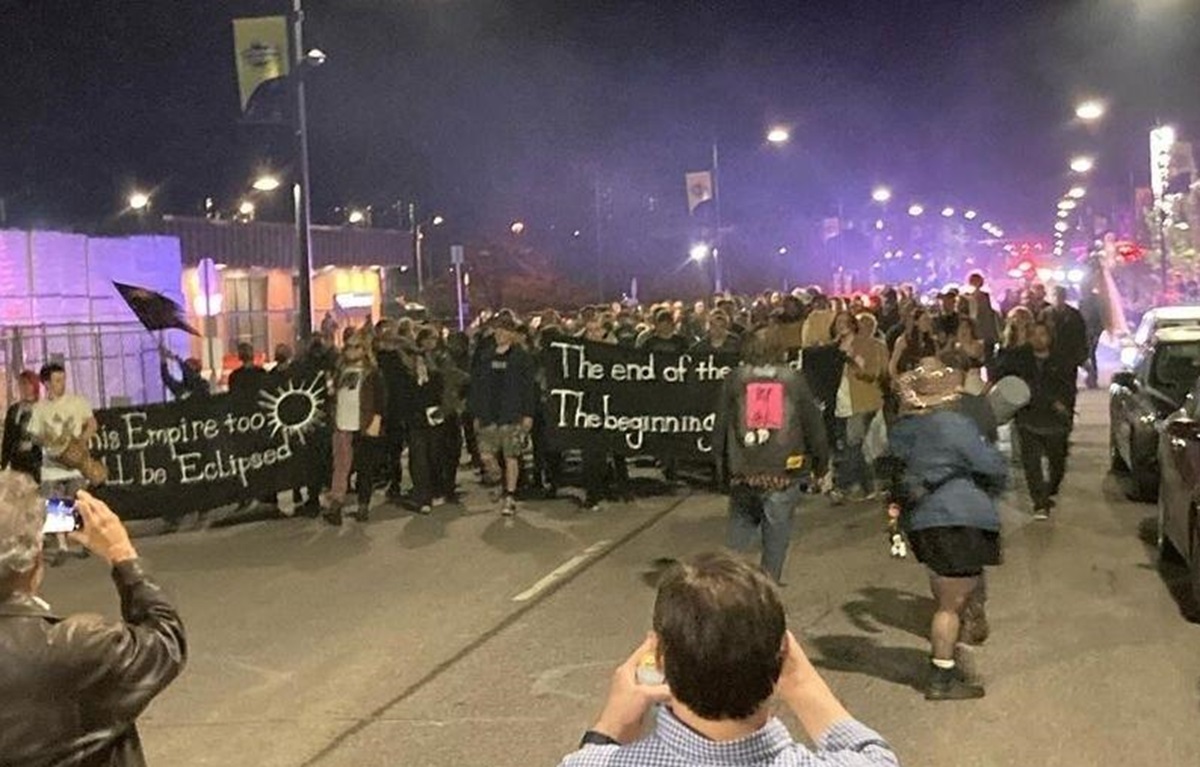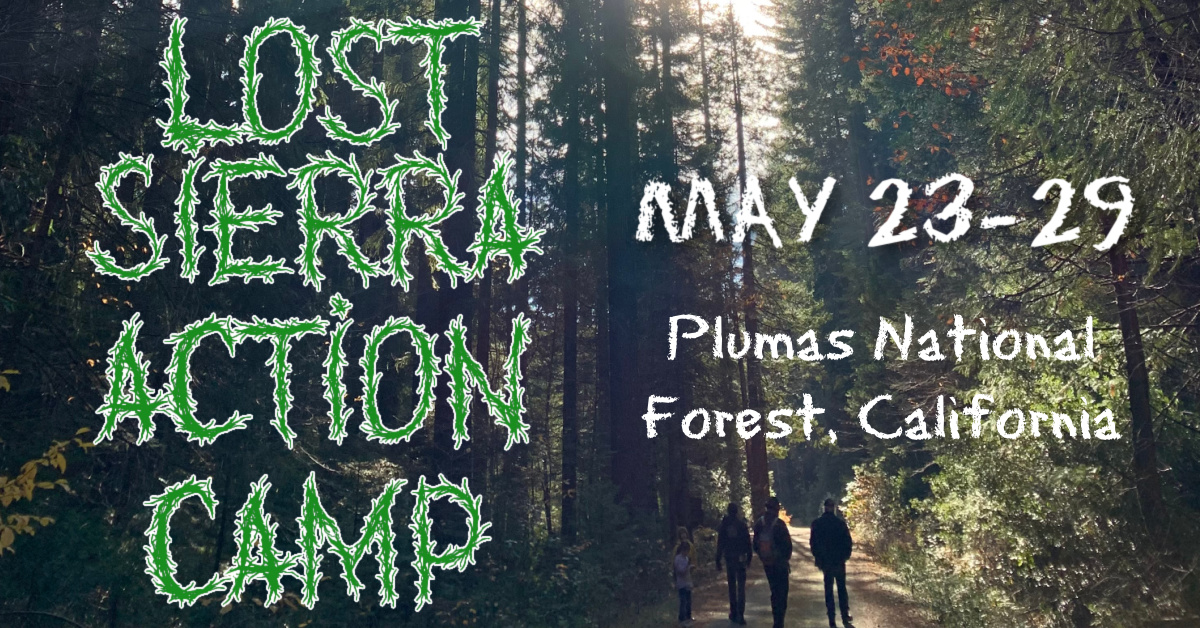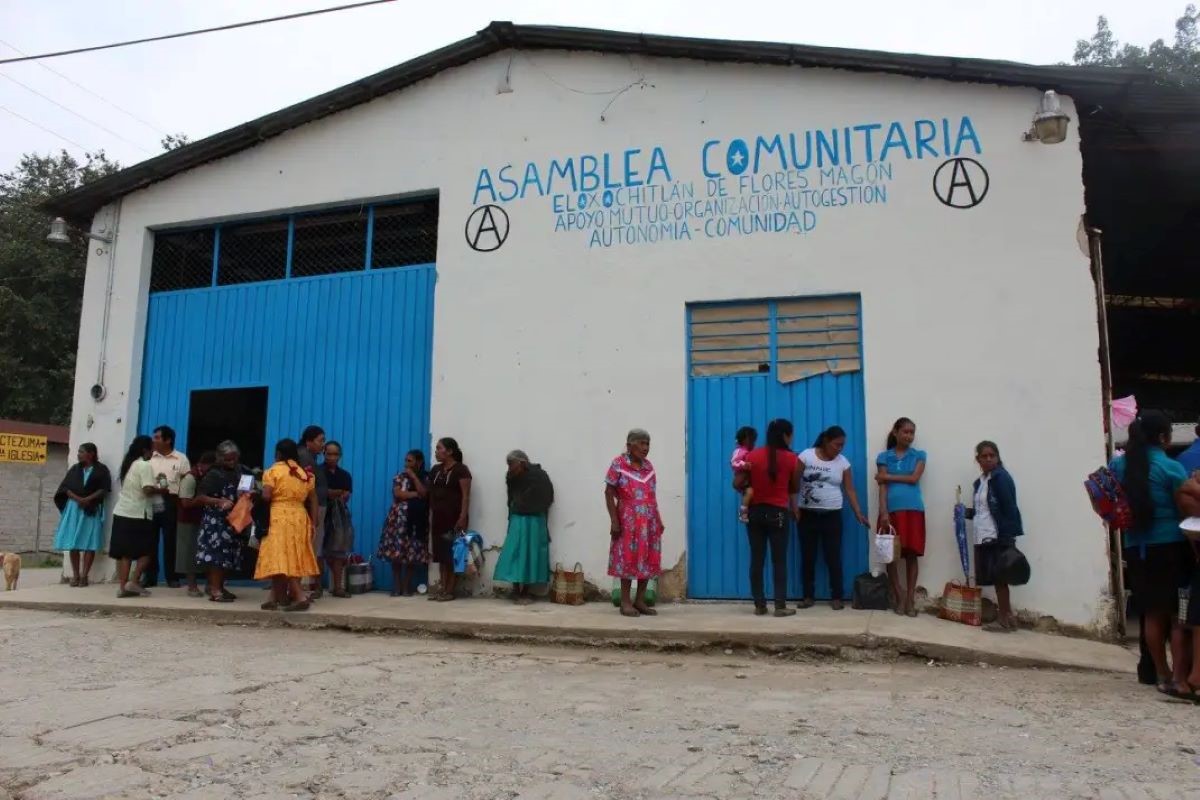Filed under: Analysis, Anarchist Movement, Featured, Southeast, White Supremacy
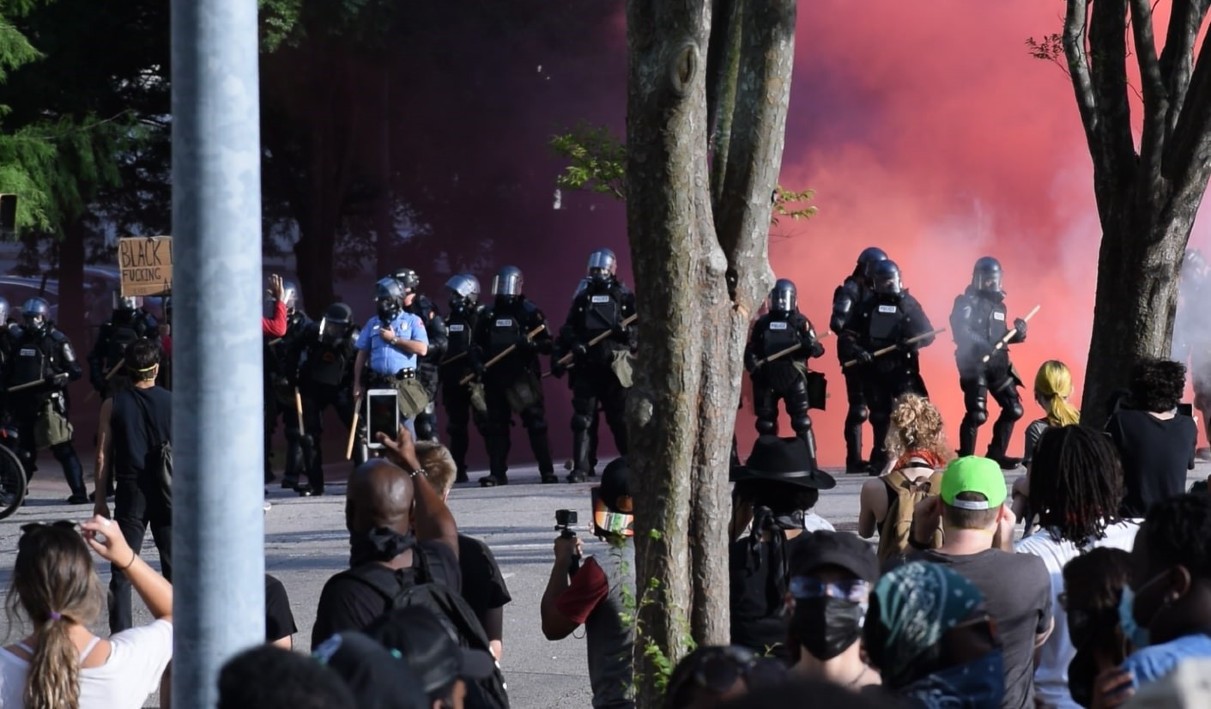
Reflections on the George Floyd rebellion on the streets of Raleigh, North Carolina.
The first time the Raleigh Police Department shot a rubber bullet at me, I dodged. They had set off a third (fourth?) tear gas canister, and I, in two layers of masks and squinting against the familiar burn, was hauling a blinded comrade out of the thick of the gas as he choked and spat.
The bullet soared in a high arc, fist-sized, black against the overcast May sky. Instinctively I sidestepped, pulling my comrade with me as the projectile ricocheted off the asphalt where we’d stood; in the chaos of the gas and the bullets I stumbled and cracked my elbows on the sidewalk. Then it was the blood and the bullets and the gas and the shouting. We were just people in jeans and handmade masks standing against the shields. It’s not supposed to be combat, but there’s a reason protestors call it frontlining. The sudden escalation shocked many of the young people in the streets, and as I staggered out of the line of fire the shouts devolved to sobs and the huffing hyperventilation of panic attacks; my comrade raced blindly up the hill away from the cops.
I leaned heavily against the closest exterior wall, sheltered in a corner behind a column; I didn’t notice the blood until I saw it dripping off my fingers onto the sidewalk.
“You good?” A medic—I knew them by the goggles distributed by the ragtag medic collective downtown and the sport-tip water bottle for eye rinses—stepped into the little shelter of the corner I’d found, their head ducked conspiratorially toward me.
“Yeah,” I said. “Go help.”
And so they rushed back into the gas.
The second time the Raleigh Police Department shot a rubber bullet at me it hit. I was standing on the grassy sloped hill outside the North Carolina state capitol while the riot cops and national guard with rifles loaded stood in line against the rebels in the street. The rebels had taken over the intersection, sprawled on the pavement supine like corpses, like their comrades murdered by cops. I had a spray bottle of diluted milk of magnesia, to neutralize the tear gas I expected, and a duct tape red cross on my ballcap (in hindsight, a target, but I was still green). The standoff ensued: rebels shouting, cops brandishing their beating-sticks and shields and pepper spray and guns. The paddy wagon and the tank-like LRAD loomed ominously behind them, the tools required to stun us with noise then cart us, protestors with bikes and skateboards and flags and water bottles, to the jail. Then, just before the canister sounded its familiar thwack-crash-hiss, I lost my breath and stumbled backward.
Four steps backward. Pain, dull throbbing blooming across my chest. No breath. Eyes wide. Choking on nothing. “Are you okay?” someone asked, can’t remember who they were, or what they looked like, pain-distracted, but I said, dazed, “They fucking shot me.”
At the time I was furious. I stayed and treated rebels for three hours, tear gas and pepper spray and falls and panic attacks as the military and the cops surrounded us from both sides, pulling people, kids, out of the gas, directing people to exits, go together, that way, this way. More and more soldiers, more gas, more guns, they split the group, running, shouting, confusion, violent arrests; eventually my fear outweighed my anger. I slipped away and biked three miles home fueled by adrenaline and terror, gasping for breath at red lights.
The wound was right in the center of my sternum, perfectly circular like a half-dollar; it broke the skin, healed, became a garish green-yellow bruise, then scarred. I breathed wrong for a week after.
I took to the streets of Raleigh, North Carolina during the George Floyd uprising with a shiny new EMT certification and a long history of what I called ‘divestment activism’: I arranged my life in such a way that my skills or limited resources didn’t go toward despicable institutions, and I supported my community in tangible ways where I could. I saw my role in the uprising as two-pronged: first, I had emergency medical skill, and I had a duty as a white woman to “leverage” my whiteness—to block the faces of protestors of color, and put my body between the rebels and the cops to prevent further brutality.
Going into these actions, I thought my whiteness would protect me. Regardless of what happens at the action I am white. I believed the qualities that initially signal membership in the cult of white supremacy (my white skin and my gender presentation) would significantly decrease the likelihood that police would enact violence on me specifically, and thus my presence, and the presence of others like me, would reduce the chance of violence enacted on the rebels. Naïve, and an underestimation the police’s love of violence, a love I didn’t really comprehend until I saw the leadership pace behind the line of riot cops, shouting violent encouragement as the cops hooted and smacked their fists against their body armor.
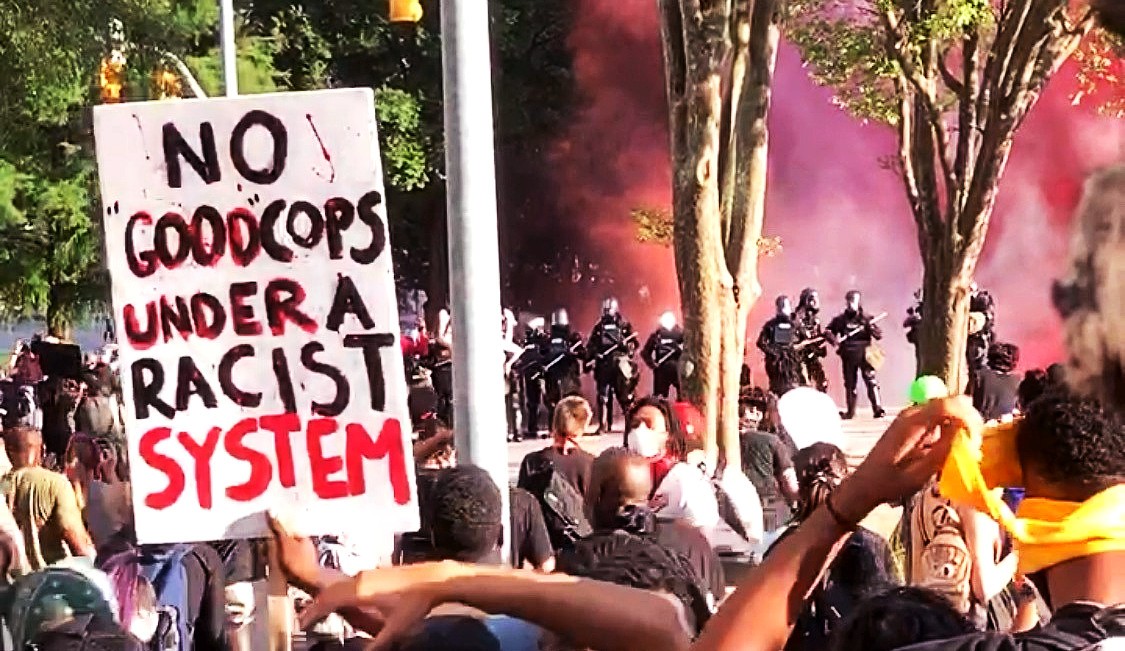
White supremacist society is built upon the unpaid domestic labor of white women, both in the home and outside it, in the way we organize our social groups and, in heteronormative nuclear families, raise white children. I’d thought I wasn’t buying the goods because of my deviant sexuality, which to some extent guaranteed my exclusion from the benefits. But I looked like I fit: your standard young abled white woman.
When a cop saw me pull a Black man out of the fog of tear gas and then decided to shoot me, it was not because I had the audacity to be in the way. Historically (and presently) white women generally prioritize defending whiteness over struggles toward gender equality. We can be counted on to maintain the status quo of subjugation, because the material benefits provided by whiteness outweigh the price of cowing to patriarchy. To be subjugated by white men is to still be above everyone else. And when we break from those assumed roles, there are consequences. White women are responsible for maintaining the “purity” and “morality” of the white race through hetero sex and childbearing, and historically we weaponized the imagined threat to whiteness by playing the victim, accusing Black men of rape to incite lynchings in our “defense.” White women are still, of course, women, so we are to be controlled. When a woman breaks the rules she’ll be put back in her place—especially by cops, who are by definition violent agents of white supremacy.
I have always struggled with existing as a woman in the world, not out of any internal gender identity conflict, but from the pain of living under misogyny: harassment, violence, the heteropatriarchal gaze both internal and external, the simple ever-present feeling of being less than. I thought it was womanhood I struggled with but it’s not—it’s white womanhood, and for us white women there is no subversion of gender roles nor real resistance to misogyny without race treason.
The goal of the white race traitor is to eat away at white supremacy from the inside, by “violat[ing] the rules of whiteness so flagrantly that they jeopardize their white standing,” as the editors of the 1990s journal Race Traitor wrote. The goal is to display through action that white skin does not immediately mean loyalty to whiteness. Disloyalty threatens the assumed universality of white supremacist beliefs, however subconscious, by white people. Dangerously, it leads to class solidarity—to human solidarity.
Race treason is not a state, it’s an act continuously committed as often as possible. Whiteness is loath to let us go, and it self-perpetuates through complacency. Consider racist “microaggressions.” These exchanges are commonly framed as occurring between an (often ignorant) white person and a person of color, where the white person subtly reinforces white supremacist power dynamics, like invasively touching a Black woman’s hair under the guise of finding it “cute” or “different.” These interactions are a form of racial signaling to other whites in the vicinity. When white bystanders ignore it, due to awkwardness or embarrassment or hesitation, the power dynamics are implicitly sanctioned. Race treason is often as simple as interjecting into those interactions to take the burden of confrontation off the person of color, and to demonstrate to the offender that their behavior is not tacitly approved. Of course this comes at a cost—it can lead to awkwardness at work, breaks in friendships, turmoil in family relationships. It’s frustrating, uphill, and never-ending. It’s gotten me labelled buzzkill, sensitive, over-serious, bitch, difficult, irritating. And what a joy it is to disrupt the racial solidarity—to fluster and to offend. To discover that the foundations are not nearly as stable as I’d feared.
So I was shot on purpose in the solar plexus for the crime of standing on public property with a squirt bottle, and I stayed on-scene to keep treating rebels. The attack activated a sense of fuck-you survivalism. And it was definitive proof that what I was doing was impactful enough that I, specifically, needed to be taken out of the equation. Race treason by white women is so transgressive and frightening that our presence will not de-escalate actions due to the historic “benevolent sexism” of white men “protecting” white women, as I’d thought would be the case. When we break ranks, we provoke.
Whiteness poisons a fulfilling existence. It prioritizes capital over life, and property over people; it values unjust laws and it cannot exist without the subjugation and oppression. It lacks empathy, its sense of ‘community’ is laughable. I don’t want to mitigate my white privilege via corporate seminars and hand-wringing book groups. I want the end of whiteness. The cop’s reaction, brutal as it was, proved that in that moment I had defected. There is a way to push back, to step outside of the cult however briefly—to be perceived by agents of a heretofore-considered unbreakable system as a threat. They shot me and I got back up.
I live near a shopping center. Over the years I’ve lived in my apartment the neighborhood has transformed, the shopping center has gone luxe, the rents have ticked up, and across the street the old apartments have been replaced with million-dollar condos. My neighbors, a DJ, a teacher, a restaurant worker, are gone now, replaced by transient students and a rich white couple who I’ve met once, when they shouted at and filmed me via iPad as I tried to help a college kid who’d crashed his car into their brick exterior. During the Floyd uprising the governor deployed the national guard and tasked them with standing in the parking lot with loaded weapons and bored expressions. Despite the fact that every year I grew closer to being priced out it was still my neighborhood—how dare they. Couldn’t do much to stop the guard, but I did slap my anger onto a painted sign and hold it for hours on the corner. I wanted my neighbors to know that poor people still lived here, and not all of us would stand by idly while the military defended Duxiana Luxury Mattresses as people were tear gassed a mile away.
On the third night a cop drove up to where I was standing with my sign, rolled down his window, and said, “If you’re out here for much longer, you better watch your back.” Then grinned. Whooped his sirens, then pulled a u-turn and jumped the curb, close enough to hit me, sending me staggering backward, sign dropped in fright. Recently, I received notice that my neighborhood, named after a slave-owner, would be renamed.
It’s strange to be the enemy. Strange to go to work on the restaurant line the next day aching and coughing from the falls and the gas, knowing with new profundity that our democracy is rotten as long as the cops rove the streets, as long as whites close their eyes to the horrors required to maintain the status quo, to the incarceration, the trauma, the murders, the injustice.
While I was on the line I looked up and locked eyes with someone buying a coffee before their shift at the restaurant next door. I recognized them by their eyes and their gait—the medic who had stood close to me against the wall as I dripped blood onto the sidewalk, in a moment of care (“You good?”) and trust (“Go help.”). They raised their coffee. I ducked my chin.
It’s strange to think, in that moment of silent secret camaraderie, with the goofy eyebrow wiggle of recognition, the gesture of the broke and the gay and the scheming, that we’re onto something.


